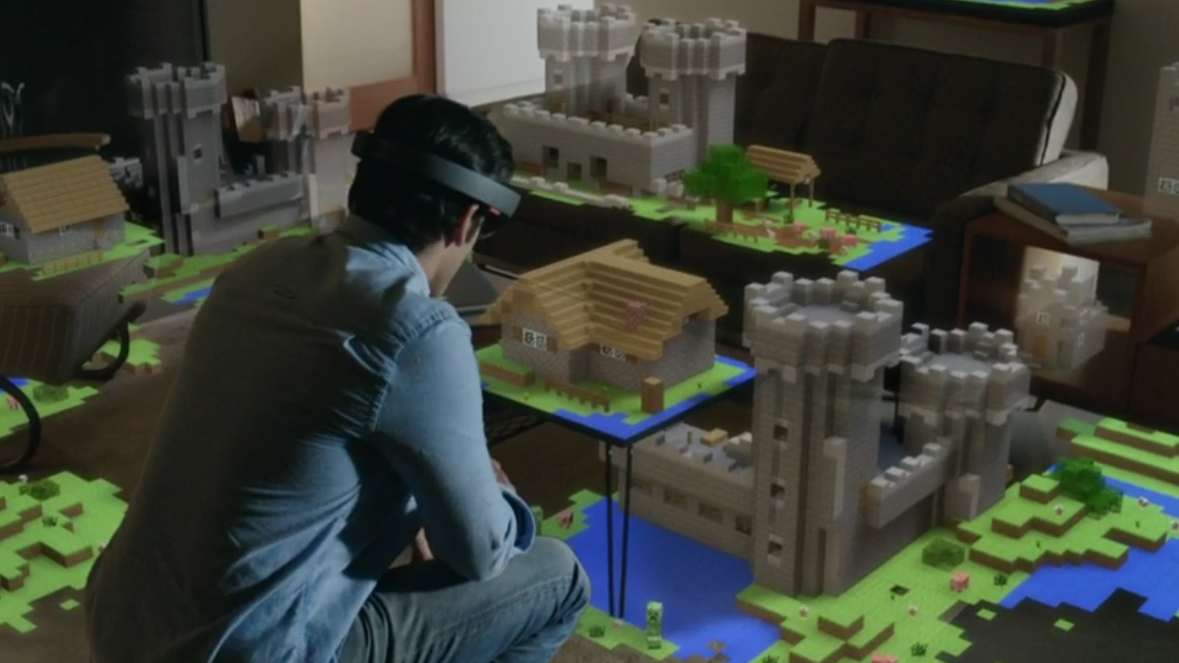What's up with the HoloLens? Is Microsoft just trying to be different?
Are those really holograms?

Sign up for breaking news, reviews, opinion, top tech deals, and more.
You are now subscribed
Your newsletter sign-up was successful
We've been waiting for a Microsoft virtual reality something or other for a while now and finally, during the Windows 10 event, we were introduced to the HoloLens, which is neither VR or even augmented reality but "high definition holograms" according to Chief Inventor Alex Kipman.
But what does that even mean? The demo presented didn't have holographic projections. Rather they were projections from a seemingly well constructed augmented reality device. AR devices like Epson's Moverio attempt the same thing: interacting with digital content while wearing AR glasses. Microsoft has simply taken it a step further and supposedly improved the design, no doubt thanks to its massive amount of resources.
So why is Microsoft calling the HoloLens a holographic experience? Likely because the market is entrenched with burgeoning VR and AR devices. This industry isn't new but it's beginning to gain traction and popularity because people are starting to do it right.
Where Sony has its foot firmly in virtual reality with Project Morpheus, Microsoft now has the HoloLens and apparently holograms. It almost sounds like a marketing gimmick to keep up with the generations of Oculus Rift head mounted displays, and to stay ahead of the many lesser known augmented reality devices out there.
Microsoft essentially needs to define holograms for the general public. While watching the various videos of the HoloLens in action during the Windows 10 event, there were so many instances where I thought, "Wait, isn't this augmented reality? What's up with this hologram talk?"
Whatever Kipman and co., are doing they need to pick a camp (AR? AR equals holograms?) and clarify what the tech is in order to remain relevant. Big name companies spitting out "innovative tech" means nothing if your device doesn't make sense - anyone remember Sony's HMZ-T3W? Didn't think so.
The future PC?
Microsoft is unquestionably right to assume that VR and AR - or "holograms" - are the future of computing. It's unclear if the HoloLens will live long enough to see that future, but it looks promising.
Sign up for breaking news, reviews, opinion, top tech deals, and more.
The HoloLens took seven years to build and it's still in the prototype stages. So far all we know is that there are transparent lenses with unspecified advanced sensors, spatial sound, CPU, GPU, HPU (Microsoft's own holographic processing unit) and Windows 10 software. Most significantly, the HoloLens is untethered. The tech will supposedly solely rely on voice and gestures without aid of cords or keyboards.
But this meager amount of information raises more questions and concerns for me. Sure untethered is amazing, but what will the battery life be like? The Oculus Rift and Project Morpheus are hooked up to PCs (for now) which is how they get juiced up. The Gear VR is untethered because it relies on the Samsung Galaxy Note 4 and only gets about two hours of usage. The amped up computing power of the HoloLens sounds like it will eat up the battery much faster especially without PC support.
Then there's pricing. Google Glass's $1,500 (about £991.83, AU$1855.29) is exorbitant enough for a prototype that's now basically dead in the water. The Oculus Rift is estimated to be between $200-$400 (£132-264, AU$247-495) which is more reasonable but we still don't have a release date so it could change depending on how much Crescent Bay improves. That leaves the question, will the HoloLen's hardware and software make it Glass pricey or closer to the Rift? And if it is on the higher side, will it go the way of Glass?
Functionality is also key here. Just how well will the voice and gesture commands work? If the company is taking cues from the Kinect, then it's not very promising. The Kinect has improved since the Xbox 360 days but not by much and remains a pretty disappointing Xbox One feature.
Right now, Microsoft needs a big win in both the hardware and software departments. Trying to play catch up with Apple and Android with phones, Bing versus Google, the Xbox One versus the PS4, the hatred for Windows 8, the list goes on and on. The Surface Pro 3 is a fantastic feat but has only seen moderate success. It's been pretty silent on the Microsoft Band front as well.
Windows 10 looks like it has greatly improved and will probably make Microsoft the top OS dog again, but with so many other Redmond products that are nearly there, the HoloLens will need a lot to push it to the forefront of augmented and virtual reality.
We probably won't see the HoloLens in our living rooms for a while but I'm confident that Microsoft can pull it off and impress us all just as Oculus has over the years.